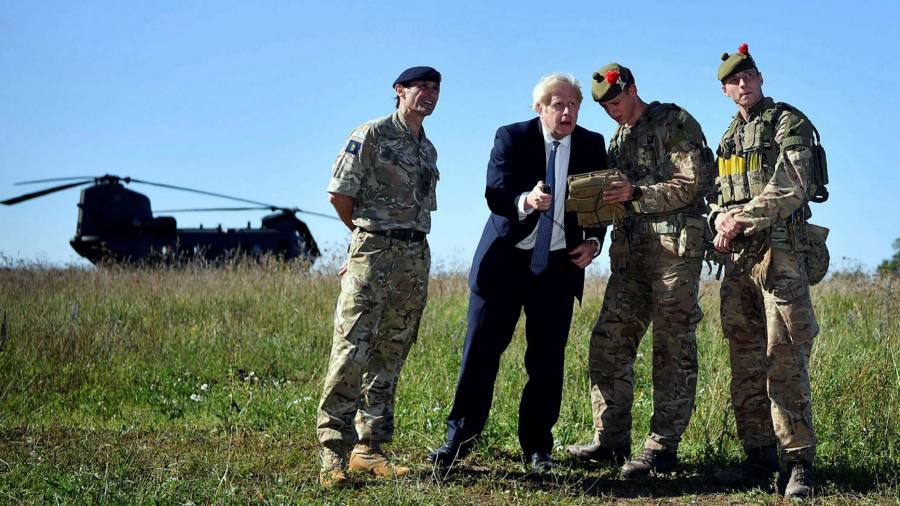[ad_1]
The UK armed forces will use artificial intelligence to predict adversaries’ behaviour, perform reconnaissance and relay real-time intelligence from the battlefield, according to technology companies that work for the government.
Military chiefs hope that applying AI technology to warfare — a key feature of the government’s new defence and security strategy, due out next week — will provide commanders with better information during critical operations.Â
Boris Johnson, the prime minister, has already made clear that modernising the armed forces will depend on harnessing machine learning.
“We will focus our investment on the new technologies that will revolutionise warfare: artificial intelligence, unmanned aircraft, directed energy weapons and many others,†he told the Munich Security Conference last month.
Johnson also said that the £16.5bn funding boost for defence, announced last Autumn, would help fund a new military research centre for AI — which is expected to involve the redeployment of some personnel from the Ministry of Defence’s science and technology laboratory at Porton Down.
Rob Bassett Cross, a former army officer whose data analytics company, Adarga, is contracted to the MoD on two AI projects, said there was potential for the armed forces to use machine learning as a “global radar†for threat intelligence.
Algorithms trained to focus on particular threats — such as enemy weapons capabilities — can translate and analyse announcements and military intelligence from adversaries in China, Russia or North Korea, according to Bassett Cross.
“AI has the ability to be dynamic and you can ask it questions. So you could be alerted when threats are identified,†he said. “You can have it providing suggested judgments for decision-making. You can have it writing reports, you can have it updating certain scenarios for you.â€
Bassett Cross added that even though these capabilities already exist, the UK military is still “relying on a small number of humans†to absorb and process intelligence from around the world.
Adarga is contributing to a contract between the software developer Improbable and the UK’s Strategic Command on a virtual reality programme which would create a digital replica of Britain, allowing military chiefs to “war game†operations and boost defences. The company is also licensing AI software to Strategic Command under a separate contract with BAE Systems.
Bassett Cross said potential military AI functions for consideration by the MoD include automating analysis of drone footage for reconnaissance and building tools which can determine the function of a building in a foreign city based on the movement of people and vehicles around it.
Oliver Lewis, a former MoD intelligence officer who is co-founder of the tech firm Rebellion Defence, which works with the UK government, said AI will allow “soldiers, tanks, and weapons systems to become supercomputers which are absorbing and analysing intelligence on the battlefield†via wearables and cameras, running their own algorithms.
“One of the most exciting things about AI is the potential for active data triage by a machine,†Lewis said. “The problem at the moment isn’t data collection, it’s sifting and surfacing to a commander the relevant bits of information for making decisions. It’s the software orchestration of war, and that means for the first time we can connect air, land, cyber and sea battles.â€
Earlier this month the US’ National Security Commission on Artificial Intelligence, which is chaired by former Google chief executive Eric Schmidt, produced a 765-page report warning that China is planning to undermine US conventional military superiority by “leapfrogging†to new technologies.
The Commission raised concerns that Beijing is “training AI algorithms in military games designed around real-world scenarios†and that China’s military leaders “talk openly about using AI systems for ‘reconnaissance, electromagnetic countermeasures and co-ordinated firepower strikes’â€.
“[The US] will not be able to defend against AI-enabled threats without ubiquitous AI capabilities and new warfighting paradigms,†the report concluded.
[ad_2]
Source link






